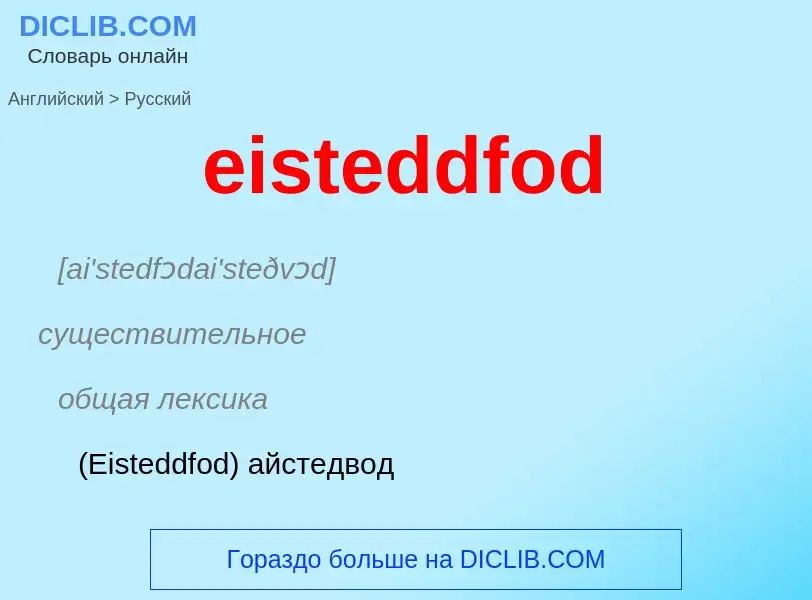Vertaling en analyse van woorden door kunstmatige intelligentie ChatGPT
Op deze pagina kunt u een gedetailleerde analyse krijgen van een woord of zin, geproduceerd met behulp van de beste kunstmatige intelligentietechnologie tot nu toe:
- hoe het woord wordt gebruikt
- gebruiksfrequentie
- het wordt vaker gebruikt in mondelinge of schriftelijke toespraken
- opties voor woordvertaling
- Gebruiksvoorbeelden (meerdere zinnen met vertaling)
- etymologie
Eisteddfod - vertaling naar Engels
[ai'stedfɔdai'steðvɔd]
существительное
общая лексика
(Eisteddfod) айстедвод
состязание бардов (ежегодный фестиваль в Уэльсе)
конкурс непрофессиональных певцов и поэтов (часто молодых)
ежегодный фестиваль бардов (в Уэльсе)
[aɪs'teðvɔd]
общая лексика
айстедвод, состязание бардов (фестиваль валлийских певцов, музыкантов и поэтов; проводится ежегодно в Уэльсе)
(eisteddfod) айстедвод (конкурс непрофессиональных певцов и поэтов, часто молодых)
Валлийское выражение
съезд
синоним
Definitie
Wikipedia
In Welsh culture, an eisteddfod is an institution and festival with several ranked competitions, including in poetry and music.: xvi The term eisteddfod, which is formed from the Welsh morphemes: eistedd, meaning 'sit', and fod, meaning 'be', means, according to Hywel Teifi Edwards, "sitting-together." Edwards further defines the earliest form of the eisteddfod as a competitive meeting between bards and minstrels, in which the winner was chosen by a noble or royal patron.
The first documented instance of such a literary festival and competition took place under the patronage of Prince Rhys ap Gruffudd of the House of Dinefwr at Cardigan Castle in 1176. However, with the loss of Welsh independence at the hands of King Edward I, the closing of the bardic schools, and the Anglicization of the Welsh nobility, it fell into abeyance. The current format owes much to an 18th-century revival, first patronized and overseen by the London-based Gwyneddigion Society. It was later co-opted by the Gorsedd Cymru, a secret society of poets, writers, and musicians founded by Iolo Morganwg, whose beliefs were "a compound of Christianity and Druidism, Philosophy and Mysticism.": 191
Despite the Druidic influences and the demonstrably fictitious nature of Iolo Morganwg's doctrines, rituals, and ceremonies, both the Gorsedd and the eisteddfod revival were embraced and spread widely by Anglican and nonconformist clergy. The revival therefore proved enormously successful and is credited as one of the primary reasons for the continued survival of the Welsh language, Welsh literature, and Welsh culture after more than eight centuries of colonialism.
During his two 20th-century terms as Archdruid of the Gorsedd Cymru, Albert Evans-Jones, whose bardic name was Cynan and who was a war poet and minister of the Presbyterian Church of Wales, created new rituals for both the Gorsedd and the eisteddfod which are based upon the Christian beliefs of the Welsh people rather than upon Modern Druidry. After watching an initiation into the Gorsedd at the 2002 National Eisteddfod, Marcus Tanner wrote that the rituals "seemed culled from the pages of Tolkien's The Lord of the Rings.": 189
Since its 18th-century revival, the eisteddfod tradition has been carried all over the world by the Welsh diaspora. Today's eisteddfodau (plural form) and the National Eisteddfod of Wales in particular, are in equal parts a Renaissance fair, a Celtic festival, a musical festival, a literary festival, and "the supreme exhibition of the Welsh culture.": 52
In some other countries, the term eisteddfod is used for performing arts competitions that have nothing to do with Welsh culture or the Welsh language. In other cases, however, the eisteddfod tradition has been adapted into other cultures as part of the ongoing fight to preserve endangered languages such as Irish, Cornish, Breton, Scottish Gaelic, Canadian Gaelic, Guernésiais, and Jèrriais.

![bardic chair]] at the 1991 [[National Eisteddfod of Wales]]. bardic chair]] at the 1991 [[National Eisteddfod of Wales]].](https://commons.wikimedia.org/wiki/Special:FilePath/Eisteddfod 1991.jpg?width=200)


